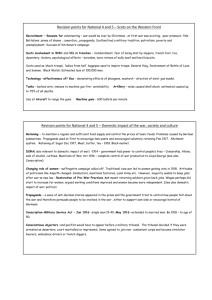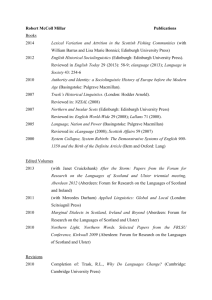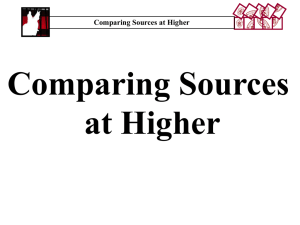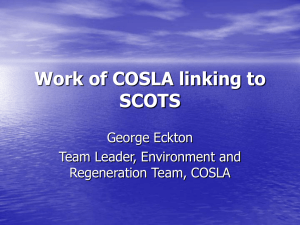Open - The Scottish Government
advertisement
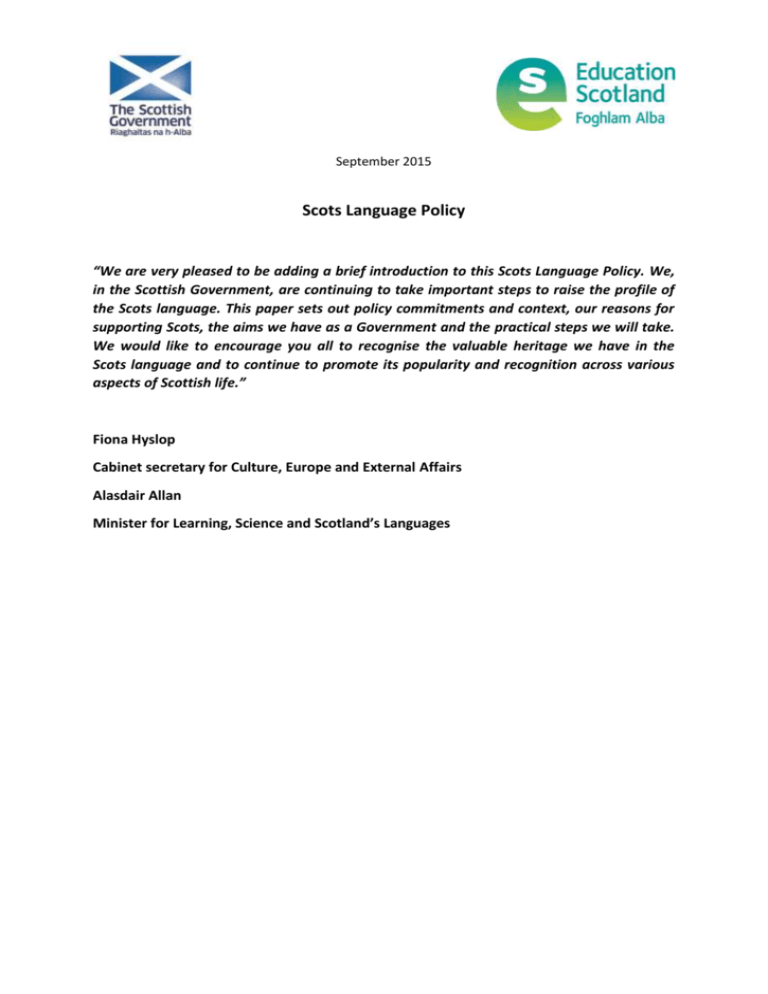
September 2015 Scots Language Policy “We are very pleased to be adding a brief introduction to this Scots Language Policy. We, in the Scottish Government, are continuing to take important steps to raise the profile of the Scots language. This paper sets out policy commitments and context, our reasons for supporting Scots, the aims we have as a Government and the practical steps we will take. We would like to encourage you all to recognise the valuable heritage we have in the Scots language and to continue to promote its popularity and recognition across various aspects of Scottish life.” Fiona Hyslop Cabinet secretary for Culture, Europe and External Affairs Alasdair Allan Minister for Learning, Science and Scotland’s Languages September 2015 A Scots Language Policy The Scots language is an essential element of the culture and heritage of Scotland. For many of us, it is a familiar aspect of our song, poetry and literature and a recognised feature of how we express ourselves in our community life. Scots language is only spoken within Scotland and it is not used anywhere else in the world by a community of significant number or extent. Therefore steps need to be taken within Scotland, to ensure its preservation. The 2011 census indicated that over 1.5m people identified themselves as Scots speakers. It is, therefore, right that Scots should continue to be reflected in education, arts, media and more. The Scottish Government will promote and support Scots and encourage its respect and recognition in order that, what for many is the language of the home, can be used in other areas of Scottish life. Policy Context This policy has been prepared in response to a Scottish Government manifesto commitment. Along with the manifesto commitment there are other statements and commitments below which demonstrate the policy context that Scots is set in and the level of priority being accorded by Scottish Ministers to the Scots language. Manifesto Commitments In 2011 the Scottish Government adopted manifesto commitments on the Scots language. The Scottish Government agreed to ‘develop a national Scots language policy, with increased support for Scots in education, encouragement of a greater profile for Scots in the media, and the establishment of a network of Scots coordinators. A previous Scottish Government manifesto commitment said we would ‘introduce a question on Scots in the census’. This question was in the 2011 Census and over 1.5 million people in Scotland identified themselves as Scots speakers. Council of Europe The Scottish Government also supports the application of the provisions of The Council of Europe’s Charter on Regional or Minority Languages. The Scots provisions include the undertakings that policies should be based on recognition of the regional or minority languages as an expression of cultural wealth and also include the need September 2015 for resolute action to promote regional or minority languages. The undertakings also include the facilitation and encouragement of the use of Scots in speech and writing; in public and private life; the provision of appropriate forms and means for the teaching and study of Scots, and more. Culture Scots and culture are inextricably linked. As both a spoken and written language with a pedigree stretching back centuries, it continues to have a distinctive impact on Scottish society. Scots song, poetry, literature and drama have a strong tradition and Scots can also be seen to influence more immediate aspects of modern life through television, film and its increasing popularity in social media. To ensure sustainable cultural growth for Scots it is important that the media and publishing worlds are encouraged to engage with their Scots speaking audience. A language of the people, from Border ballads to bairnsangs, and from post office queues to parliamentary records, Scots is as vibrant and varied as its speakers today. Curriculum In the Literacy and English: Principles and Practice document (2009)1, one of the key documents of Curriculum for Excellence, it says of Scots that, ‘the languages, dialects and literature of Scotland provide a rich resource for children and young people to learn about Scotland’s culture, identity and language. Through engaging with a wide range of texts they will develop an appreciation of Scotland’s vibrant literary and linguistic heritage and its indigenous languages and dialects. This principle suffuses the experiences and outcomes and it is expected that practitioners will build upon the diversity of language represented within the communities of Scotland, valuing the languages which children and young people bring to school.’ Scottish Studies 1 The Scottish Government also agreed to ‘develop the concept of ‘Scottish Studies’ in our schools, creating a distinct strand of learning focused on Scotland incorporating Scottish History, Scottish Literature, the Scots and Gaelic Languages, wider Scottish culture and Scottish current affairs. All pupils will have access to this strand at Primary and Secondary levels’. http://www.educationscotland.gov.uk/learningteachingandassessment/curriculumareas/languages/litandenglish/ principlesandpractice/index.asp September 2015 Ministerial Working Group The Scottish Government also established a Ministerial Working Group on the Scots Language. This Group produced a Report with recommendations2 in 2010 and the Scottish Government continue to act in accordance with these recommendations. Rationale This section briefly lists the key reasons why the Scottish Government values and promotes the Scots language. The Scottish Government values the linguistic heritage of all of the people of Scotland and recognises Scots as an essential part of this. The Scottish Government recognises Scots as one of the three historical indigenous languages of Scotland along with Gaelic and English. The Scottish Government acknowledges the importance of recognising, promoting and developing the Scots language in all its regional varieties. The Scottish Government recognises the richness of the Scots language as expressed in song, poetry and literature. The Scottish Government regards Scots, in its written and spoken forms, as a valid means of communication. The Scottish Government recognises the important role that school education has in promoting the use of Scots. Aims The Scottish Government recognises that the Scots language is an integral part of Scotland’s heritage, national identity and current cultural life. The Scottish Government, working with other partners in Scottish public and community life, will be guided by the aims below: 2 enhance the status of Scots in Scottish public and community life; promote the acquisition, use and development of Scots in education, media, publishing and the arts; http://www.gov.scot/Publications/2010/11/25121454/1 September 2015 encourage the increased use of Scots as a valid and visible means of communication in all aspects of Scottish life. Practical Steps In order to further these aims, the Scottish Government will endeavour to: create awareness amongst all stakeholder groups that Scots is one of the three historical indigenous languages of Scotland and should therefore be afforded equal respect; promote a coherent approach to the planning, learning, teaching and assessment of Scots within the context of related national policy and the national Curriculum for Excellence (CfE) implementation plan; provide access to relevant resources which encourage the use and study of Scots within the framework of related national policy and the CfE implementation plan; encourage all stakeholder groups to develop and implement Scots language policies; continue to provide support for organisations which actively contribute to the preservation and promotion of Scots language; and, encourage partnership working between all groups and bodies with an interest in supporting the Scots language. September 2015 Scots Language Policy Appendix The Scottish Government’s manifesto commitment also included the establishment of a network of Scots co-ordinators. This network has been established and is located in Education Scotland. Their Action Plan is attached below and includes further positive steps that the Scots co-ordinators are taking to support the Scots language. Education Scotland: Action plan (March 2015 – April 2016): The Scots Language Coordinators will continue to develop awareness amongst learners, their families and the wider community that Scots is a language. This will be achieved through dedicated web space on the Education Scotland website, Glow, local press and engagement with relevant organisations. the Scots Language Coordinators will help to implement the National Scots Language policy while supporting local authorities, partners and individual institutions to engage with the document in ways which will encourage the use of Scots in developing literacy skills and addressing the Raising Attainment for All agenda Education Scotland will accept and value any form of communication in Scots. As corporate signage, logo and strapline come up for renewal Education Scotland will deploy a trilingual approach as opposed to the current bilingual approach. The Scots Language Coordinators will provide templates/suggestions for those staff who wish to sign off emails in Scots or include appropriate Scots greetings. Education Scotland will ensure that a team within the organisation has specific responsibility for promoting a coherent approach to the planning, learning, teaching and assessment of Scots within the context of related national policy and the Curriculum for Excellence implementation plan. The Scots Language Coordinators will develop a full progression in Scots to make explicit for practitioners, learners and parents the links between Scots and literacy. Education Scotland will collate and publish annotated exemplification for assessment of Scots. Education Scotland will continue to develop and support the Glow online Scots language professional learning community. The Scots Language Coordinators will continue to develop and maintain Education Scotland’s dedicated Scots web space. September 2015 The Scots Language Coordinators will continue to develop resources to enable teachers to confidently and creatively engage with Scots, working with such partners as Historic Environment Scotland, the National Library of Scotland and Glasgow University amongst others. The Scots Language Coordinators will continue to work with partners such as the Scottish Book Trust to provide blogs which will encourage practitioners to use Scots as a means of developing transferable literacy skills. Education Scotland will ensure the implementation of the Adult Learning Statement of Ambition takes account of Scots language and culture. Education Scotland will inform and engage with parents and carers about the place of Scots language in Curriculum for Excellence through regular updates in Education Scotland’s e-bulletin for parents and carers, Parentzone3, and face to face presentations at parent events where appropriate. As practitioner and local authority expectations of support for Scots in schools have been raised by the current level of Scots Language Coordinator engagement, Education Scotland will continue to meet this demand for professional learning in ways that will contribute to the Raising Attainment for All agenda while building practitioner capacity and confidence. The Scots Language Coordinators plan to refine the Scots professional learning they offer to have a clearer focus on developing transferable literacy skills through Scots. They will clearly link this CLPL approach to the GTC Scotland Professional Standards, and will explore the possibility of having this professional learning accredited for Professional Recognition. Education Scotland will continue to manage, promote and develop the Scots Language Ambassadors scheme, linking it to the new Scots Scriever residency at the National Library of Scotland and the Raising Attainment for All agenda 3http://www.educationscotland.gov.uk/parentzone/


